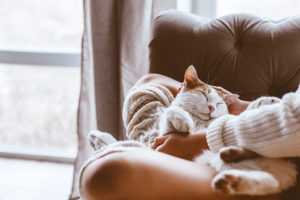After rescuing a cat, we’re on a steep learning curve
January 25, 2023
“That white thing is going to eat me,” the Chap declares upon meeting the Christmas cat. Newly arrived, a rescue, Frankie has slunk into an avowedly dog home, all milky mercury as she threads among us, leaping onto windowsills, toppling book stacks and padding across the laptop’s keyboard while attempts are made, in distracted vain, to write in the blare of summer’s heat.
Confession: we are besotted. Gazing in wonder at the new arrival among us and all her servants now. Yet one remains unmoved. The Chap. On the dog’s side. He says he already has a cat in his life – his teenage daughter – and one is enough.
When contemplating the momentous occasion of cat adoption the call went out on Twitter: “Serious pressure to welcome a rescue cat. Avowed dog person here. Brave new world. Do they smell? And do they have a personality – or will I be looked at disdainfully for the rest of her existence?” The responses were of a type. “Realise you are there to meet its needs. Do not get above your station in life.” “She will look at you with disdain forever. You are now staff. She is your feline over-mistress.” “You will do as you are told.” “Our cat’s poo stinks, but [our] teenage son’s room has a more offensive odour. I’m keeping him too.” “Will eat you if you die alone.” Encouraging.
Chloe the dog is gushy with enthusiasm, Frankie unmoved by the canine tail wagging with increasing shades of desperation. Early days, but a delicate ballet persists; there are regular, tightly clutched mini summits as we humans try somehow to bring about some form of rapprochement. A mate suggests rubbing raw chicken on both their faces so they can each lick each other. This seems a long way off.
Sleeping arrangements have yet to be finessed. “Expecting a normal cat, I got one which insists on sleeping under the covers in my arms,” explained one Twitter responder. I got one that enjoys padding nonchalently across my bewildered face at night, which feels a touch too close to a metaphor for motherhood. Because of the disrupted sleeps (all of us, except you know who), we now have an elaborate preparation ritual every evening as the dog is confined to someone’s room while the cat roams the living areas. All bedroom doors are firmly shut while we cower – sorry – sleep in our bedrooms. Not sure if this is the done thing. On a steep learning curve. People tell us cats are far easier than dogs but we have yet to experience this. Do not get me started on cat litter.
“Don’t do it,” warned one Tweeter. “They’re killers. Cute kitten phase will pass. Killing instinct does not.” Which is why our Frankie is an indoor cat. She gazes at the bush from her windowsill, narrowing her eyes to the call of the wild. In those moments, I get a hint of another creature entirely.
Her one function in this household is to exist, in beauty. To move with a sinuous grace that seems poured like liquid from the very gods themselves while we stare, mesmerised (except for, well, you got it.) When she rubs against legs it releases something within; the momentary bliss of requited love. Dogs, those big, boofy galloots, dive straight in with an enthusiasm that reeks of inferiority and need. Cats? You have to earn the love.
We’re placing bets as to how long it’ll be before The Chap is wrapped around Frankie’s dear little paw, just like the rest of us. He says he’s gaslighting – or “catlighting” – her. Which seems to work a treat; she’s obsessed with him of course. Ah, so very cat-like. Meanwhile, I’ve not yet worked out how to counter the silky padding across the keyboard and the sprawling across the desk exactly where the laptop usually sits. You’d think Frankie was trying to tell me something. Time for a break?
– Nicki Gemmell, The Australian
Nikki Gemmell is the best-selling author of thirteen novels and four works of non-fiction. Her books have been translated into 22 languages. The French literary magazine Lire has included her in a list of what it called the fifty most important writers in the world – those it believes will have a significant influence on the literature of the 21st century.





